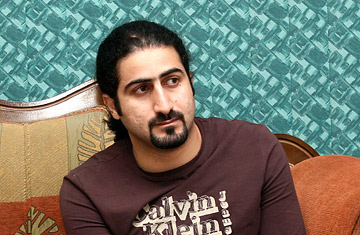
Omar bin Laden, a son of Osama bin Laden asked for political asylum in Spain.
Will he go for a chic pied-a-terre in Barcelona's Barri Gotic? A hacienda amid the Andalusian olive groves? Or will Omar bin Laden discreetly opt, as so many of his countrymen already have, for a marble and gilt-clad villa in Marbella?
Whatever his preference, he'll have to get out of the Madrid airport first. On Monday, the fourth son of al Qaeda leader Osama bin Laden took advantage of a layover on his Cairo-to-Casablanca flight to seek political asylum in Spain. But on Wednesday, Spain's Interior Ministry confirmed it had rejected his request. A ministry official said the government determined that bin Laden did not "meet the conditions necessary for entering Spain." (The ministry official spoke on condition of anonymity in line with government policy.) He has 24 hours to make an initial appeal and remains in a holding room at Barajas airport.
It is not the first time that the 28-year-old bin Laden, who has publicly called on his father to reject violence, has sought asylum outside the Arab world. Earlier this year, he made the same request at the British embassy in Cairo, asking for a settlement visa that would allow him to live in the U.K. with his British wife Jane Felix-Browne — who now goes by the name of Zaina Mohammed Al-Sabah. Although in that case he alleged that his life was endangered both in his native Saudi Arabia and in Egypt, where he currently resides, the British were apparently unmoved by his plight. The embassy rejected the petition on the grounds, according to several British newspapers, that his presence in the country would cause "considerable public concern."
Now Omar and Zaina have set their sights further to the south, and few experts can figure out why. "It's not as though Spain is an especially easy country in which to gain asylum," says Alfredo Abad, director of the Spanish Refugee Aid Commission. "We have some of the lowest acceptance rates in Europe." In fact, only 570 of the 7,664 who sought asylum in 2007 were granted, a drop in acceptance, says Abad, of 58% compared to the previous year.
The fact that Spain has been the victim of jihadist terror — 191 people died in the Madrid commuter train bombings of March 11, 2004 — would also seem to work against bin Laden's favor. "Al Qaeda and Osama bin Laden himself have signaled that Spain continues to be a target," says Jesus Nuñez, co-director and security expert at Madrid's Institute for Conflict and Humanitarian Action Studies. "That would suggest that Spain isn't going to receive his [son's] petition with joy."
Nuñez also rejects the idea that bin Laden Jr. has cause to hope to win the support of his countrymen in Spain. Saudis do have considerable influence among Spain's Muslim community, since they have financed a number of mosques, including Madrid's huge Islamic Cultural Center, and also helped engineer, according to many observers, a recent, unexpected change in the leadership of Spain's Islamic Commission. But it hardly follows that they would support Omar, no matter how convincingly he distanced himself from his father. "Saudi Arabia wants to show the world it is doing everything it can to crack down on terrorism," says Nuñez. "So it would be a little strange to think that they're going to push for the cause of a bin Laden."
But all may not be lost for Omar, who has declared himself an "ambassador of peace." Although, as the press here predicted, his plea was rejected, he does has multiple opportunities for appeal. And even if that fails, he may still get what Spanish newspaper El País suggests he is truly after. Not the villa in Marbella, perhaps, but at least publicity for a forthcoming book on his relationship with his dad.
